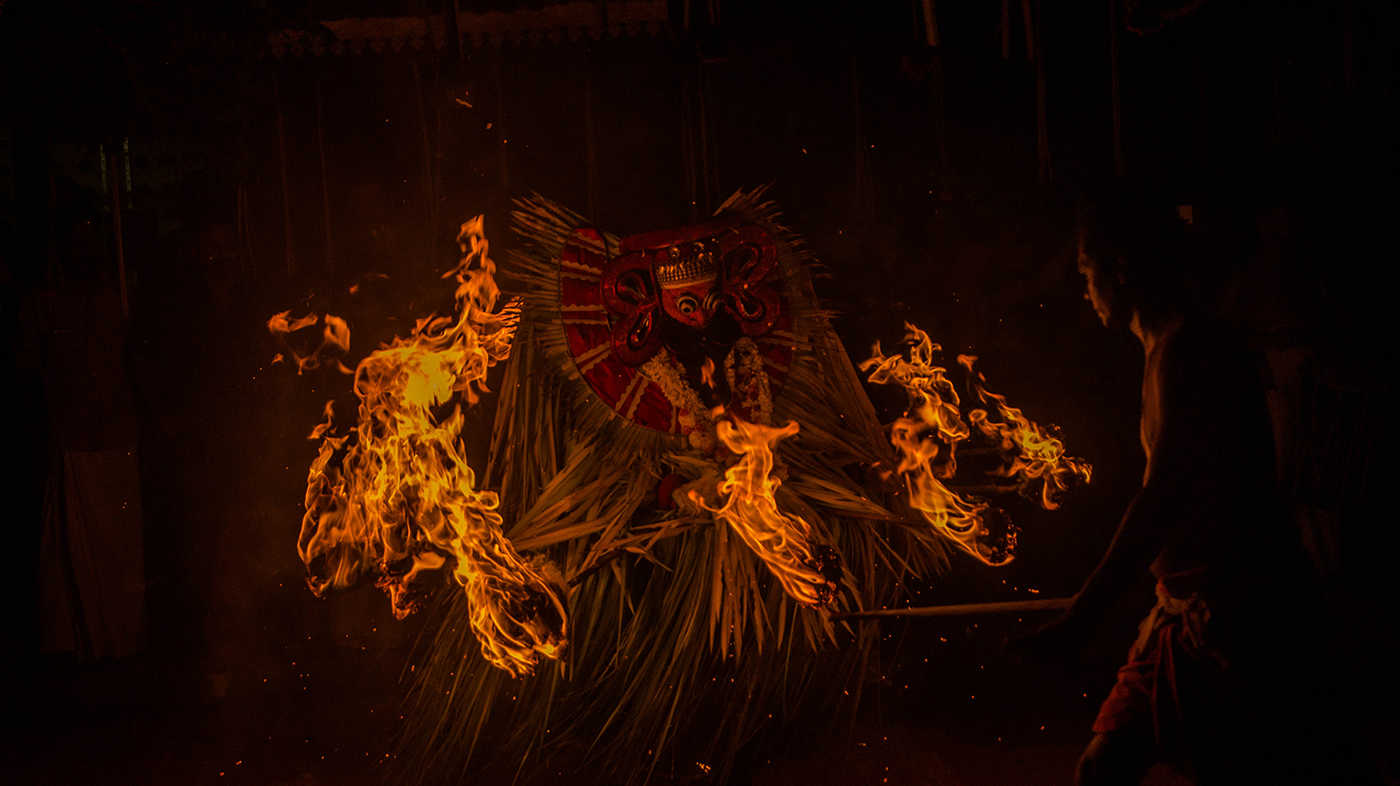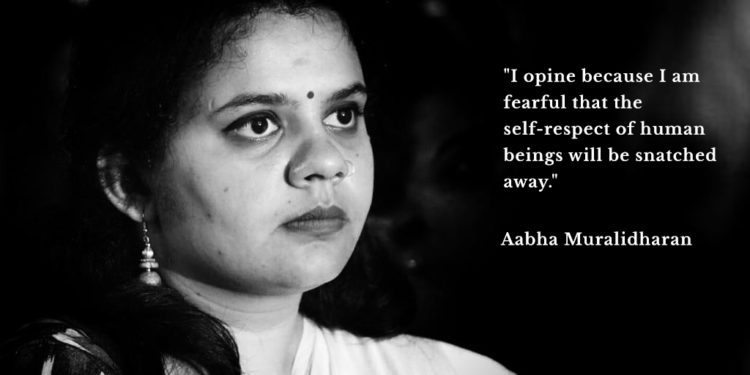Aabha Muralidharan is a Documentary Photographer who believes in the power of the visual medium and its impact in establishing narratives. Her areas of interest include caste, sexuality, race and their interaction with gender. She did her masters in Gender Studies, where she did her dissertation on the use of visual culture in creating masculinities in Malayalam cinema.
Apart from that, she is known for raising her voice against social injustices around her. She has around ten thousand followers on Instagram, where you will find her singing songs of revolution and dissecting the country’s political developments, and much more.
How much influence does your upbringing have on forming the ideologies you have today?
I was born and raised in a progressive family. My parents were migrants from Kerala in Hyderabad. The liberal education I received in school, with these two distinct cultures I was part of, lay the foundations for my ideas of equality and justice.
You have studied at the Amrita Institute, and you have shared that it was different from a regular education space and rigid, especially when it comes to freedom of thought. The Aabha we know is fearless when it comes to expressing her opinions. How do we outgrow the institutionalisation of ideas?
I don’t think I am fearless. I live in fear looking at the state of this country. I fear what will happen to my family, consisting of individuals who engage with the same world that I am a part of if they don’t self-critique. For example, what kind of life the women of my family will have to live if the actions of the men aren’t questioned. What types of oppressions an individual with varied or intersection of identities (caste, sexuality, gender, religion) will have to endure if I don’t question those prejudices in my own life? I opine because I am fearful that the self-respect of human beings will be snatched away.
With time, any idea or ideology gets institutionalised and becomes an apparatus. From my experience, the only way to outgrow this is to constantly engage with the work of being a critique. Ask questions and make that a practice. The moment we cease to ask questions, we become active agents of that institution. We can maybe start by writing this down on the mirror we look at every day or the opening page of our journals – I have a question to ask.
Have you chosen a career as a documentary photographer after doing your master in Gender studies from Ambedkar University? How did you choose your field of interest?
I landed at the doorsteps of the University with a lot of questions in my mind. See, I had just come out of a college that actively did not let me seek answers.
Social Science gave me tools to engage with the world I came from. That is when I began to critically look at my photographs and asked myself: why am I taking a photograph? Is it for societal validation and a back tap or for political action?
Gender Studies is an emerging stream within social science that looks at the world, keeping gender as the vantage point of analysis. Thus my photographs aren’t always about society; I see them be displayed for the public. There are also photographs that sometimes question and often try to document power and pleasure in the most intimate spaces; within friendships and my family.

Do you have that one project or idea which you would consider your best or life-changing experience professionally?
As I mentioned earlier, the photos I click or my thoughts through words are works in progress. I keep going back to them with a critical lens and ask – is this the only way I could have clicked, or is there a possibility to add layers of stories to them. Even the last of my photos or writings wouldn’t be my best.
In December 2016, I attended a social audit arranged by the Mazdoor Kisan Shakti Sangathan (MKSS). I was hustling with a camera in hand, trying to capture moments from the audit. In the process, I managed to take a tight portrait of a frail-looking wrinkled face. He was about 93 years old. After the event, my friend accompanying me asked if I clicked a photo of this particular man.
I showed her the photo and waited for her to narrate his story. She said, “He is a farmer, and the Government acquired his land to build the industrial belt running from New Delhi to Gujarat. He came to the audit demanding full compensation.
The reparation he got was three rupees.” Since the number three in verbatim is used to denote units, I asked, “you mean three lakhs?”. This friend of mine took her wallet out and placed three one rupee coins on my palm. That was a defining moment that changed my relationship with my camera. I don’t know if he is alive today or if the State compensated him but what I do know is that I would no longer stick to frames that wouldn’t talk about stories.

Mass media is one of the most pursued career choices. You have a fair share of experience and have seen the ups and downs in your career. Do you have any advice for somebody new to the field?
I used to work with a well-known lifestyle magazine in Kerala and eventually moved out of it due to ideological dissonances. I could no longer write or take photographs glorifying hotels when I knew that lakhs of farmers had died by suicide. I don’t know if I am in a position to advise, but all I can say is if your work (be it any; films, music, art) adds to the oppression and deaths of human beings alive today, it is no longer work but a tool of the ruling class, and you are an accomplice.
You are vocal about the political developments in the country. What made you feel that it is vital to raise your voice?
Injustices. Look at what is happening in this country. Public sector undertakings that are run by the money we pay as taxes are sold off to private individuals/entities. Labour laws have been diluted. Right to Information Act which gave power to the people has been amended.
The citizenship and integrity of communities are questioned. Policies such as EIA Draft, National Education Policy, Health Policy are introduced in coveted manners. There is inflation; cylinder and petroleum prices are at an all-time high. Laws and Acts are bulldozed, stifling even the voices of opposition in the Parliament. We are witness to State-sponsored migrant exodus, violence, pogroms, massacres, rapes, and genocides. Health care is non-existent; we saw that in the month of April. Family members and acquaintances were running from pillar to pillar, searching for oxygen cylinders. Thousands of children have become orphans. There is poverty, unemployment, and misery everywhere.
My friends and loved ones live in a constant state of fear, not knowing when they will be lynched or raped. Whom am I trying to fool when I see my mother cut down on essentials for the kitchen or my father counting the last pennies as the month-end approaches? What is the point of my life if I cannot fight for dignity?
Will you define yourself as an activist?
Over the years, one of the things I have been trying to do is to liberate myself from labels. Labels circumscribe our thoughts and limit the scope of work. An activist is anybody who acts to change the political, social, and cultural status quo.
I used to associate myself with the word, but now I understand that it is my responsibility to do the same. Destabilizing power structures within interpersonal relationships is also political action, but would that be considered activism? Maybe not in the larger institutionalization of activism. My interventions are also to question the politics of definitions. So, no.
Do you have any message to young girls who have are shackled into a regressive surrounding?
The first step would be to realize that you come from a regressive background. Once you do that, you will find friends who are either on the same page with you or people who have given their lives to fight oppression. Read books, listen to music, watch films or strike a conversation with anybody is who is not you.
The practice of engaging with people who aren’t your caste, gender, religion, sexuality, country, race will open worlds that you never knew existed.
It is okay to be afraid but remember that there are thousands of people waiting to listen to your story and hold your hands as you find your way to freedom.
Also Read: Jamia RCA Producing Civil Servants In Bulk; More Like A Family









